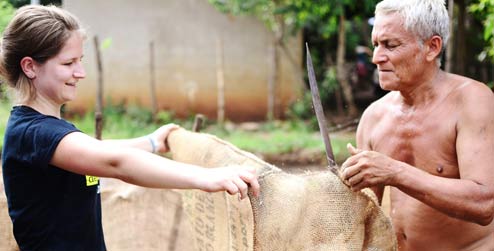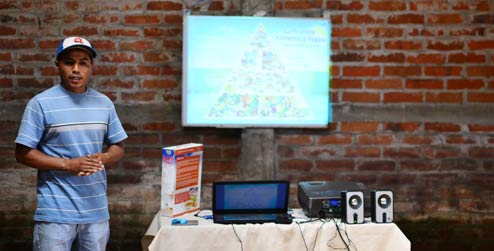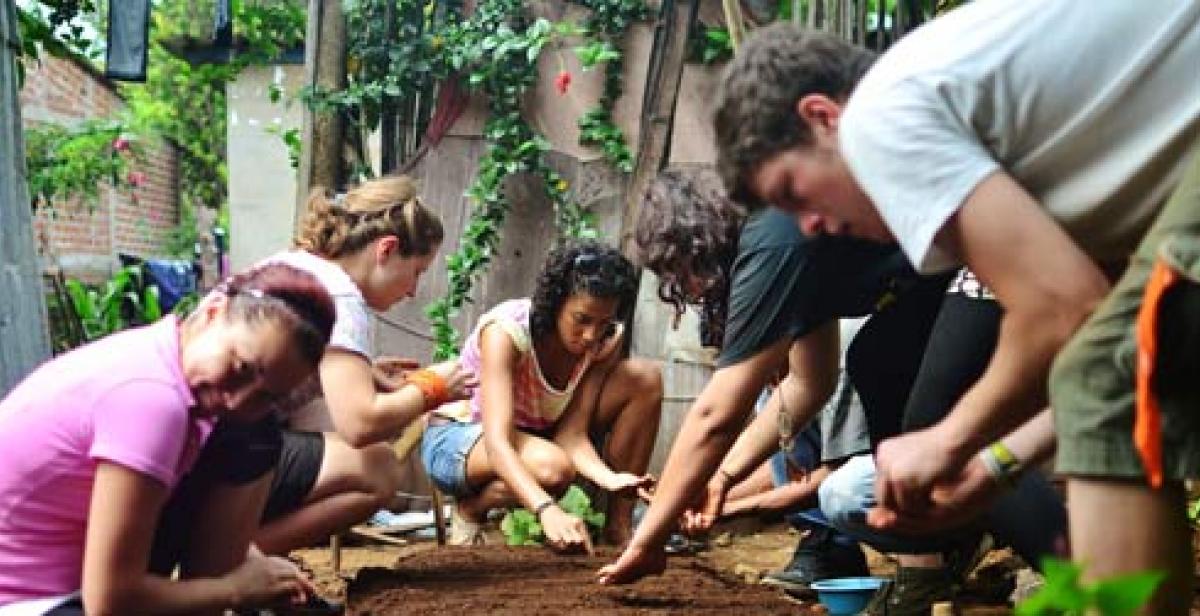It doesn’t really feel like it but I’ve been working for nearly four weeks in rural El Salvador on this project now. I have reached the halfway point of my time here and we’ve already done a hell of a lot; I’m really having fun, and I feel like the stuff that we’re doing is actually having an impact here in Bendicion.
The project centres around building gardens for families, and we’ve got pretty damn good at making them. The work is by no means easy: even after growing more accustomed to the climate, labouring in the intense tropical heat while wearing the tropically-themed black Progressio t-shirts really is intense (but I can’t say unsatisfying).
We’ve had some interesting times while making the gardens too: for instance, Don Jorge Lima’s (The cataract suffering and incredibly friendly President of the Community Association) garden needed fences built to keep chickens out, and so used the readily available chicken sacks. Having members of the group hold the sacks, he cut the bags up with his massive machete, but his expression of clearly struggling to see got a few heart-rates going! Luckily the fence still stands and all of the group (that could before) can still count to ten on their hands.

For each garden that we create we first dig up and turn the soil in measured strips using Picaches (pickaxes). Next we break up the soil with hoes before adding the delicious cocktail of tierra negra (black soil), cascajo (porous gravel) and chicken dung - which really packs a delightful, dizzying odour in this searing heat. Once the beds are mustered, we build small walls around them with stones and wood to keep the structure, and on one occasion we had to build a larger fence to keep chickens away from the seeds, which proved quite interesting.
The seeds are obviously also important to the project (and along with the dung-drawn flies inspired this blogs name). My group has run one community meeting where we handed out seeds to the women in the community and another about the benefits of having organic vegetable gardens. It was a long day - we had to rewatch long videos, and both give and hear presentations, all with bilingual translation, but those present at the meeting showed a genuine interest and if that means the gardens will be successful then the meeting was a success.

We explained the harms of pesticides (as mentioned: a big issue here) and how this helps the environment; the benefits from good nutrition; and also food security. Food security is the main reason ADESCOM FM requested the gardens and it is a major issue in El Salvador.
Natural disasters are firmly rooted into Salvadoran life: it’s a hot spot for earthquakes because of its location on the San Andreas fault; it has over 20 volcanoes; it routinely floods during each year’s rainy season (the word rain means a lot more here than in the UK); and it’s vicinity to the Caribbean means tropical storms are possible, though irregular.
During such disasters food supplies are disrupted, and corruption inevitably creeps in, meaning that the poorest people often cannot afford to buy the simple foods they usually live on. These gardens are intended to give the women and their families some self-sufficiency with food in order to limit the harm caused by the next inevitable disaster.
Now knowing the benefits of the gardens I feel that both myself, as well as the women they’re being built for, have a lot more enthusiasm for them to be built and made successful.
Progressio ICS volunteer Jonjo Warrick blogs from El Salvador, photos (c) Jason Lovatt




Comments
Felicidades por las
Felicidades por las actividades realizadas.....
Se les agradece su participación en nuestro país.